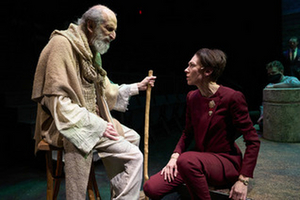Review: ANTIGONE at Cleveland Play House
Meaningful ANTIGONE gets inconsistent production at Cleveland Play House

Cleveland Play House's Artistic Director, Laura Kepley, in her comments in the playbill for ANTIGONE states, "We originally programed ANTIGONE to be produced during the 2019-2020 season. The play was in its second week of rehearsals when we had to make the heartbreaking announcement that the production was cancelled." The rampant COVID epidemic had struck the theatre world!
The pause is over and the script is now being staged in CPH's black box Outcalt Theatre.
It is ironic that the play, like the last several years, deals with not only the struggles and angst of how to live life, but how we deal with death.
As Kepley explains, "Our mourning rituals have been altered. ANTIGONE taps into our collective loss and trauma. It asks questions many of us have been grappling with: How do we honor those we have lost without losing ourselves along the way? How do we move forward?"
As Sophocles' play, ANTIGONE, begins, "the invading army of Argos has been driven from Thebes, but in the course of the battle, two sons of Oedipus (Eteocles and Polynices) have died fighting for opposing sides. Their uncle, Creon is now king of Thebes. He decrees that the body of Polynices, who fought against his native city, will not be given burial rites but will be left to rot, as a warning to traitors. Creon further decrees that anyone who does try to bury Polynices will be punished with death."
Antigone and Ismene are grieving for the loss of their brothers. Both are upset, but Antigone is also defiant. She vows to give Polynices the proper burial rites. Ismene begs Antigone to not defy the laws of the city and add to their family's tragedy. Antigone will not yield.
The play explores such themes as the right of the individual to reject society's infringement on personal freedoms, the differences between theological law and personal beliefs, civil disobedience, citizenship and the honor of family versus duties to the state.
Playwright Emily Mann has taken the script, which normally runs close to three hours in production and reimagined it. It now runs around ninety minutes and encourages color blind and gender-neutral casting. In the CPH production Creon (Vanessa Morosco) is a female. She is married to Eurydice (Laura Starnik), also a female. Both are white. Their son, Haemon, is black. Their nieces, Antigone (Mariah Burks) and Ismene Bridget Kim) are black and Asian.
Though these gender, racial and sexual differences have nothing to do with the plotline and story development, the change from the norm puts the spotlight on the changing attitudes of our culture, as it reflects the concept that the arts, theatre in this case, represents the era from which it comes. While this play was written many centuries ago, this staging represents alterations that have taken place as the attitudes and beliefs of cultures change.
The stances of Creon and Antigone are philosophically at odds with each other. Questions arise. Shall tradition rule or should they adapt to personal belief? Will the laws of the gods be followed, or shall adaptations be made to accommodate the needs and individual beliefs of the living?
Those issues are not only at the center of ANTIGONE, but the center of many of the conflicts of today.
Legal issues abound concerning the influence by religious leaders and their followers versus the views of secularists as they affect gay rights, gender equality and abortion. What should be the procedures for teaching about slavery, the role of white supremacy, the intentions of our founding fathers (there were no founding mothers), and the "war of Northern aggression/Civil War?"
The Play House production, under the direction of Lauren Keating is often successful, at other times pretentious and unnatural.
Mariah Burks's Antigone was real, developing ideas and using a presentational style that was accessible, making her thoughts and feelings clear. The same was true for Fabio Palanco (Aide) and Laura Stranik (Eurydice). Others used acting styles that harked back to the days of stylization over substance, while one member of the cast used a pronunciation and verbal style that was more appropriate for an August Wilson script. Whether those choices were intentionally made by the director or cast members, or were accidental, they distracted from the effect of the production.
Courtney O'Neill created a thrust stage set that was a perfect space for the staging. Nathan Motta's music was properly haunting, foreshadowing the play's start with ominous overtones. and accenting changes in tension and moods during the show. Karin Olson's lighting design helped create the right illusions. The costuming was as confusing as some of the acting styles.
Capsule judgment: ANTIGONE, as adapted by Emily Mann, carries as important a message of the rejection or blind acceptance of the authority of civic and religious customs and leaders today as it did when the Greek Sophocles wrote the script in the fifth-century BC. The CPH production was often successful, at other times inconsistent.
How To Get Tickets
For tickets to ANTIGONE call 216-241-6000 or go to: www.clevelandplayhouse.com
Next up at CPH: THE THREE MUSKETEERS from April 30-May 22, 2020 in the Allen Theatre.
Reader Reviews

Videos
